Assessment of effectiveness of nonspecific antidiarrheal agents in reducing the need for intravenous rehydration in children with acute diarrhea
Abstract
Background: In clinical practice, nonspecific antidiarrheals are most commonly used by clinicians along with routine treatment to hasten the recovery and to give psychological reassurance. This study was conducted to assess the effectiveness of nonspecific antidiarrheal agents in reducing the need for intravenous rehydration in children with acute diarrhea.
Materials and Methods: This was a prospective, observational study done in clinical settings for a period of 3 years at two pediatric clinics and at a tertiary care hospital. Children were divided into 5 treatment groups (viz, control, racecadotril, Mebarid, Diarex and loperamide) at the discretion of the pediatrician. One questionnaire was provided to parents to record the details about the course of diarrhea. Parents were sensitized to report any episode of complication or need for intravenous fluids.
Results: The unscheduled need for intravenous fluids due to dehydration was significantly higher in control group compared to other groups {Control: 7.37%, Racecadotril : 1.71% Mebarid: 2.4%, Diarex: 0%, Loperamide : 0%)}.
Conclusion: Present study suggests that use of nonspecific antidiarrheals may decrease the need for admission for intravenous fluids in children with acute diarrhea.
Downloads
References
2. Tripathi KD. Essentials of medical pharmacology. 6th ed. New Delhi: Jaypee Brothers Medical Publishers (P) Ltd.; 2008. Chapter 48, Drugs for constipation and diarrhea.p660-64.
3. Ghai OP, Gupta P, Paul VK, editors. Ghai essential pediatrics. 6th ed. New Delhi:CBS publishers; 2005.
4. WHO Department of Child and Adolescent Health and Development (CAH), MOHFW. Student's handbook for Integrated management of neonatal and childhood illness. 2003. [PubMed]
5. Turck D, Berard H, Fretault N, et al. Comparison of racecadotril and loperamide in children with acute diarrhea. Aliment Pharmacol Ther.1999;13(6):27-32. Doi: 10.1046/j.1365-2036.1999.00004.x-i1. [PubMed]
6. Li S-TT, Grossman DC, Cummings P. Loperamide therapy for acute diarrhea in children: Systematic review and meta-analysis . PLOS med.2007; 4(3):e98. Doi:10.1371/journal. Prned.0040098. [PubMed]
7. Hamza H., Khalifa HB., Baumer P, Berard H., Lecomte JM. Racecadotril versus placebo in the treatment of acute diarrhoea in adults. Aliment. Pharmacol. Ther.1999; 13 (6): 15–19. Doi: 10.1046/j.1365-2036.1999.00002.x-i1. [PubMed]
8. Cézard J P, Duhamel J F, Meyer M. Efficacy and tolerability of racecadotril in acute diarrhea in children. Gastroenterology.2001;120(4):799-805. http://www.cimerman.com.br/artigos/Pediatria/tiorfan%20em%20crian%C3%A7as-%20diarreia%20aguda.pdf.
9. Santos M, Maranon R, Miguez C, Vazquez P,Sanchez C et al. Use of racecadotril as outpatient treatment for acute gastroenteritis: a prospective, randomized, parallel study. J pediatr.2009;155(1):62-7. Doi:10.1016/j.jpeds.2009.01.064.
10. Manfredi M, Bizzarri B, de’Angelis GL. Racecadotril at the Beginning of Pediatric Gastroenteritis: A Small Experience of a Primary Level Hospital. Clin Microbial.2013; 2(1): 102. doi:10.4172/2327-5073.1000102.



 OAI - Open Archives Initiative
OAI - Open Archives Initiative


